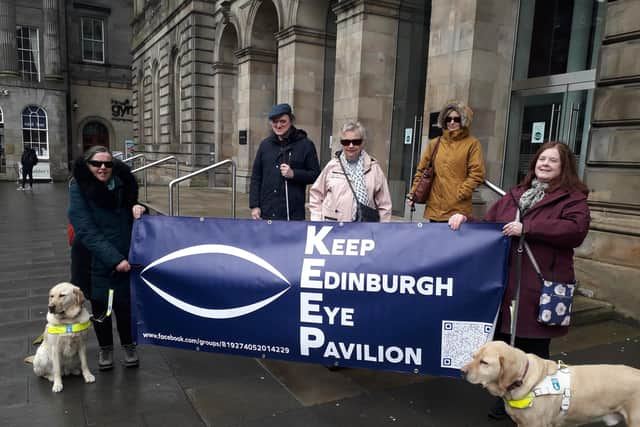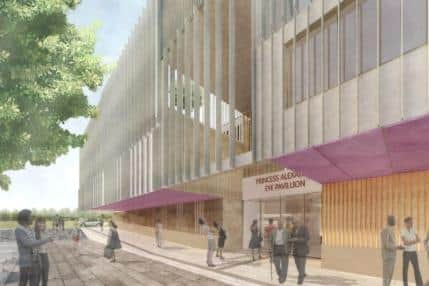Edinburgh's Eye Pavilion: Blind campaigners put case to heath board for new eye hospital
and live on Freeview channel 276
Let us know what you think and join the conversation at the bottom of this article.
The Keep Edinburgh Eye Pavilion (KEEP) group – launched after the Scottish Government said it would not fund a new hospital planned for Little France – handed in a letter at the health board’s headquarters at Waverley Gate.
First Minister Nicola Sturgeon has said during the election campaign that a re-elected SNP government would after all fund a replacement for the Princess Alexandra Eye Pavilion but has indicated she still wants to wait to see the review of eycare services the government asked NHS Lothian to carry out after the previous funding decision.


Advertisement
Hide AdAdvertisement
Hide AdThe KEEP letter asks for clarification from the health board over the review and whether funding for a new hospital would impact NHS Lothian’s wider budget.
Wilkes, all of whom have sight loss and live in Edinburgh.
It also urges that eye patients should be involved in planning the new Eye Pavilion and the re-design of eyecare services.
One of the group’s organisers, Sylvia Paton from Corstorphine, who has the sight loss condition aniridia, said: “People like myself who have used and depend on the Princess Alexandria Eye Pavilion are very concerned that this vital expertise is retained within Edinburgh.


"We are pleased there now seems to be a re-stated commitment to build a new facility in the capital, but we hope this will not be to the detriment of funding for other health services in the region.”
Advertisement
Hide AdAdvertisement
Hide AdDelivering the letter, Ms Paton was joined by fellow campaigners Joan Kerr, Hazel Kelly, Anne Henderson and Ronnie Wilkes, all of whom have sight loss and live in
Edinburgh.
The group sets out in the letter the case for locating a new facility in the BioQuarter, including ease of travel for patients with sight loss, clustering of research and technical innovation and compliance with equalities and disability legislation.
And they warn that if money is not invested in a new hospital and services are dispersed, as the government suggested, it would risk the loss of specialist staff, force patients to travel longer distances at increased cost, require large investment in the existing not-fit-for-purpose Eye Pavilion and put a strain on other services.
The letter, addressed to the chief executive and board members of NHS Lothian, says: “We welcome the public commitments by the First Minister and from all the main political parties in Scotland to ensure funding for a new Princess Alexandra Eye Pavilion in Edinburgh.”
Advertisement
Hide AdAdvertisement
Hide AdTherefore, can NHS Lothian confirm that the cost for a new facility will be met by the Scottish Government? Or would this cost have to be found from within current NHS Lothian budgets allocated to ongoing strategic plans?”
A message from the Editor:
Thank you for reading this article. We're more reliant on your support than ever as the shift in consumer habits brought about by coronavirus impacts our advertisers.
If you haven't already, please consider supporting our trusted, fact-checked journalism by taking out a digital subscription.
Comment Guidelines
National World encourages reader discussion on our stories. User feedback, insights and back-and-forth exchanges add a rich layer of context to reporting. Please review our Community Guidelines before commenting.
